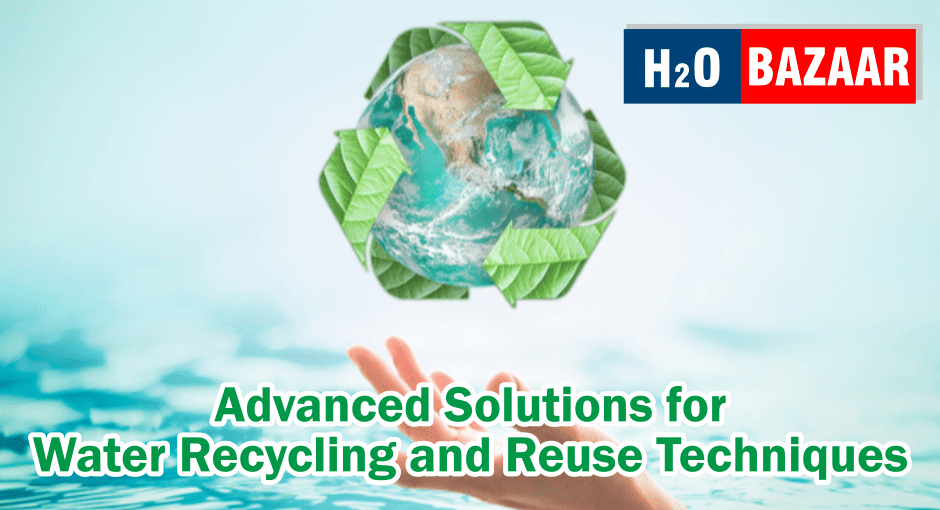


Apr 26
Everybody is talking about ‘Wastewater Reclamation & Wastewater Reuse’ these days. However, in these times of water scarcity, reclamation and reuse of water is certainly an alternative resource and there are a variety of beneficial ways of using even wastewater.
To begin with, let us understand what is ‘Wastewater Reclamation’ and ‘Wastewater Reuse’.
The treatment or processing of wastewater to make it reusable is known as ‘wastewater reclamation, whereas ‘wastewater reuse’ is the use of wastewater in a variety of beneficial ways. Moreover ‘water reclamation’ or ‘reuse’ frequently means the presence of a pipe or other water conveyance facilities for the deliverance of the reclaimed water.
In many countries, due to existing water scarcity, water pollution, lack of control measures, and protection of the aquatic environment, there is a wide scope for wastewater reclamation and reuse. Moreover, in many cities and regions of even developed countries, there is a need for alternative resources of water for the growing population. Although wastewater collection and treatment have long been standard practises, wastewater reuse is now done with due regard for sanitation, public health, and environmental protection.
According to research, the majority of wastewater is water, with only 1% being solid waste. Hence, water shortage can be overcome by reusing wastewater. With increasing population growth, there is an increase in water supply too, so unconventional water resources must be made available. Wastewater is a preferable unconventional water source. It has to be treated before it is disposed of into the environment. using wastewater treatment. We can also get help from wastewater treatment plant in India for this process.
Reusing this wastewater also helps to maintain the quality of the environment and also at the same time saves us the pressure to use natural freshwater sources. Therefore, most of the generated wastewater should be reused in the same location or collected and recycled for use elsewhere. Therefore, water management – be it freshwater, recycling, reuse or reclamation requires a thorough understanding of the sources, types, and effects of water pollution, as well as the water and wastewater treatment practices. Meet the water quality requirements of recycling and reuse.
1. Water Reuse : Water reuse implies taking wastewater, treating and disinfecting it, and then reusing the high-quality reclaimed water for beneficial purposes. Irrigation for golf courses, parks, highway medians, playgrounds, and residential properties are areas where wastewater can be reused. The type and level of treatment depend on what purpose the water will serve. The most usual form of reuse is irrigation.
2. Water Reclamation: Reclaimed water is wastewater that has been methodically treated to remove harmful organisms and particles. For example, bacteria, viruses, and heavy metals, and can be reused. Reclaimed water caters to maintain clear water supplies and provides an environmentally responsible alternative to wastewater disposal. Furthermore, reclaimed water can be used safely for a wide range of applications, such as landscape irrigation for golf courses, parks, highway medians, playgrounds, and residential properties.
3. Water Recycling: Recycling generally means the reuse of wastewater back in the same cycle where it is generated.
1. An important element of integrated water resources is utilization and management.
2. Some nutrients, for example, nitrogen, potassium, and phosphorous, bear the water reclamation procedure providing recycled water with an additional benefit. Many golf courses, parks, and local governments claim that landscaping irrigated with reprocessed water saves money on fertilizer.
3. Following water conservation, water recycling is the sole significant readily available practise that can assisst meet the increasing domestic, industrial, and environmental water requirement.
The water is clear, odourless and safe, but is not suitable for drinking and can be used for non-potable water purposes.
As per water authorities reclaimed water can be used in commercial, agricultural operations like irrigation of edible food crops such as citrus, corn and soybeans. However, before using it for agricultural purposes, it is necessary to provide education on the appropriate usage of reclaimed water, otherwise using reclaimed water for agricultural purposes is not permitted. The user must be aware and understand that reclaimed water cannot be used or connected with potable water and should not be consumed. The service provider supplying reclaimed water also should ensure that the piping systems have no cross connection with potable water systems.
Water reuse offers promising opportunities to reduce water stress and increase the scope of alternative water resources for different purposes like agricultural reuse, industrial process water and direct potable reuse. You can also visit H2O Bazaar to buy waste water treatment products. Water recycle requires a customized solution for particular applications in local water management. Professional operations and maintenance (O&M) and technologies are required for the successful implementation of reuse schemes. To allow for efficient and sustainable resource use, these reuse schemes must be embedded in sound governance structures. Grab the best deals from H2O Bazaar now.